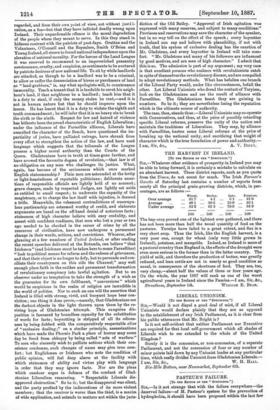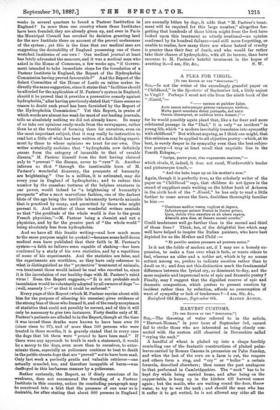PASTEUR'S FAILURE.
[TO THE EDITOR Or TER " SPROTATOR.1 SUI,—Is it not strange that with the failure everywhere—the deserved failure—of M. Pasteur's system for the prevention of hydrophobia, it should have been proposed within the last few weeks in several quarters to found a Pasteur Institution in England P In more than one country where these Institutes have been founded, they are already given np, and even in Paris the Municipal Council has revoked its decision granting land for the new Institute there on account of the proved uselessness of the system ; yet this is the time that our medical men are suggesting the desirability of England possessing one of these wretched Institutes of our own ! One medical journal at least has lately advocated the measure, and it was a medical man who naked in the House of Commons, a few weeks ago, " if Govern- ment intended to take immediate steps for the foundation of a Pasteur Institute in England, the Report of the Hydrophobia Commission having proved favourable ?" And the Report of the Select Committee of the House of Lords on rabies makes in- -directly the same suggestion, since it states that "facilities should be afforded for the application of M. Pasteur's system in England, should it be proved that it provides a preventive remedy against hydrophobia," after having previously stated that "there eeems no -reason to doubt such proof has been furnished by the Report of the Hydrophobia Commission." Yet this Report, in praise of which words are almost too weak for most of our leading journals, -tells us absolutely nothing we did not already know. So many of us take our opinions ready-made from the newspapers, rather than be at the trouble of forming them for ourselves, even on the moat important subject, that it may really be instructive to read but a little of what has been written of a fast-failing experi- ment by those to whose opinions we trust for our own. One writer ecstatically exclaims that "hydrophobia now definitely passes from the category of incurable to that of curable -disease," M. Pasteur himself from the first having claimed only to "prevent" the disease, never to "care" it. Another informs no that " through the inestimable boon of M. Pasteur's wonderful discovery, the prospects of humanity are brightening." One in a million, it is estimated, may die every year in England of hydrophobia; and to reduce this number by the ceaseless tortures of the helpless creatures in our power, would indeed be "a brightening of humanity's prospects" after a most marvellous fashion, one of the darkest blots of the age being the terrible inhumanity towards animals that is practised by many, and permitted by those who might prevent in And another of these wonderful writers reminds us that "the gratitude of the whole world is due to the great French physician,"—M. Pasteur being a chemist and not a physician, and by far the greater part of " the whole world" -being absolutely free from hydrophobia.
And we have all this frantic writing—and how much more to the same purpose might be quotedl—because some half-dozen medical men have published that their faith in M. Pasteur's system—a faith no failures seem capable of shaking—has been confirmed by a study of his own statistics, and by a repetition -of some of his experiments. And the statistics are false, and the experiments are worthless, as they have only reference to -what is distinguished as the " protective" treatment of animals, —a treatment those would indeed be mad who resorted to, since it is the inoculation of our healthy dogs with AL Pasteur's rabid virus ! Even the Report suggests,—"It is not probable such inoeulation would bevolnutarily adopted by all owners of dogs "- -(well, scarcely 1)—" or.that it could be enforced."
Every page of this Report (which M. Pasteur carries about with him for the purpose of silencing his enemies) gives evidence of the strong bias of those who framed it, and of the ready acceptance of statistics that could not possibly be °erred, and of this it will only be necessary to give two instances. Forty deaths only of M. Pasteur's patients are alluded to in the Report, thongh at the time it was issued these deaths avers known to have been over 90 (since risen to 97), and of more than 500 persons who were treated in three mouths, it is gravely stated that in every case the dogs that bit them were " proved to have been mad." If there were any approach to troth in such a statement, it would be a mercy to the dogs, even more than to ourselves, to exter- minate them, especially as policemen continue to beat to death in the public streets dogs that are "proved" not to have been mad. Only last week a perfectly gentle and valuable retriever—one actually muzzled, too, and therefore incapable of harm—was desftoyed in this barbarous manner by a policeman.
Rather curiously, the Report, as if dimly conscious of its weakness, does not recommend the 'founding of a Pasteur Institute in this country, unless its concluding paragraph may be construed into a hint that the presence of one near us is desirable, for after stating that about 860 persons in England are annually bitten by dogs, it adds that " M. Pasteur's treat- ment will be required for this large number," altogether for- getting that hundreds of those bitten might from the first have looked upon this treatment as utterly irrational—an opinion confirmed by its hundred failures—and still more forgetting, or unable to realise, how many there are whose hatred of cruelty is greater than their fear of death, and who would far rather take their chance of hydrophobia, with all its terrors, than have recourse to M. Pasteur's hateful treatment in the hopes of



































 Previous page
Previous page